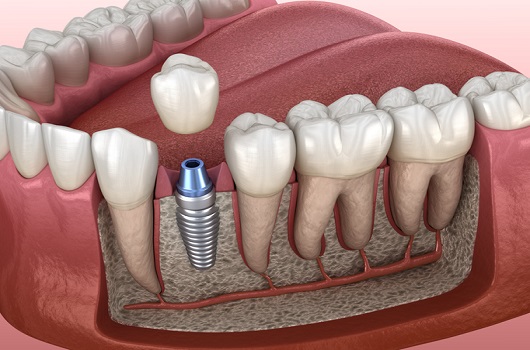| The long-term success of dental implants hinges on several key factors: meticulous surgical placement ensuring proper bone integration (osseointegration), diligent oral hygiene practices by the patient to prevent peri-implantitis (infection around the implant), maintaining good overall health to support healing and bone density, regular professional dental checkups and cleanings to detect and address potential issues early, and selecting a skilled and experienced implantologist who utilizes appropriate materials and techniques. A combination of these elements maximizes the chances of a long and healthy implant lifespan. 
The long-term success of dental implants hinges on a multitude of factors, broadly categorized as patient-related, procedural, and post-operative. Success is typically measured by implant survival (the implant remains in place) and osseointegration (the implant fuses with the jawbone). Patient-Related Factors:- Overall Health: Patients with uncontrolled diabetes, cardiovascular disease, osteoporosis, or compromised immune systems are at higher risk of implant failure. Smoking significantly reduces success rates due to impaired healing and blood supply.
- Oral Hygiene: Meticulous oral hygiene is paramount. Poor brushing and flossing techniques lead to peri-implantitis (inflammation around the implant), which can result in bone loss and implant failure.
- Jawbone Density and Quality: Sufficient bone volume and density are crucial for secure implant placement. Patients with insufficient bone may require bone grafting procedures before implant placement.
- Bruxism (teeth grinding): This habit can put excessive stress on implants, increasing the risk of failure. Nightguards can mitigate this risk.
- Patient Compliance: Following post-operative instructions, attending regular check-ups, and maintaining good oral hygiene are crucial for long-term success.
Procedural Factors:- Surgical Technique: The skill and experience of the surgeon are critical. Precise implant placement, minimizing trauma to the surrounding tissues, and proper implant selection are essential for success.
- Implant Material and Design: High-quality, biocompatible implant materials (typically titanium) and well-designed implants contribute to long-term stability and osseointegration.
- Accurate Diagnosis and Treatment Planning: A thorough assessment of the patient's overall health, oral condition, and jawbone structure is crucial for planning successful treatment. This might include CBCT scans for detailed anatomical assessment.
Post-Operative Factors:- Peri-implant Mucositis and Peri-implantitis Management: Early detection and treatment of inflammation around the implant are vital to prevent bone loss and implant failure. Regular professional cleanings are crucial.
- Prosthetic Design and Maintenance: The design and fit of the restoration (crown, bridge, or denture) are important. Proper maintenance of the prosthetic to prevent secondary complications is necessary.
- Regular Follow-up Appointments: Regular check-ups allow for early detection of potential problems and timely intervention. Radiographic monitoring helps assess bone levels around the implant.
In conclusion, the long-term success of dental implants is a collaborative effort between the patient and the dental team. A combination of good patient health, meticulous oral hygiene, skilled surgical placement, appropriate post-operative care, and regular monitoring significantly contributes to achieving excellent long-term results.
Tags: Dental Health Dental Implants Dental Restoration Implant Success Oral Surgery  
|  1,270
1,270  0
0  0
0  3350
3350 